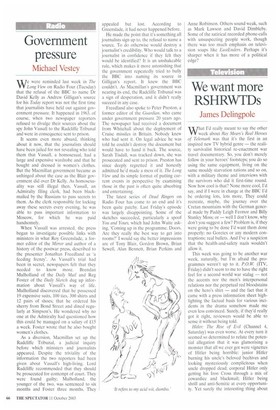Government pressure
Michael Vestey
We were reminded last week in The Long View on Radio Four (Tuesday) that the refusal of the BBC to name Dr David Kelly as Andrew Gilligan's source for his Today report was not the first time that journalists have held out against government pressure. It happened in 1963, of course, when two newspaper reporters refused to divulge their sources about the spy John Vassal! to the Radcliffe Tribunal and were in consequence sent to prison.
It seems even more absurd, thinking about it now, that the journalists should have been jailed for not revealing who told them that Vassal!, a homosexual, had a large and expensive wardrobe and that he bought and dressed in women's clothes. But the Macmillan government became as unhinged about the case as the Blair government did over Dr Kelly. As homosexuality was still illegal then, Vassall, an Admiralty tiling clerk, had been blackmailed by the Russians to pass secrets to them. As the clerk responsible for locking away these secrets every evening, he was able to pass important information to Moscow, for which he was paid handsomely.
When Vassall was arrested, the press began to investigate possible links with ministers in what Roy Greenslade, a former editor of the Mirror and author of a history of the postwar press, described to the presenter Jonathan Freedland as 'a feeding frenzy'. As Vassall's trial had been in secret, newspapers felt that they needed to know more. Brendan Mulholland of the Daily Mail and Reg Foster of the Daily Sketch dug up information about Vassall's way of life. Mulholland discovered that he possessed 19 expensive suits, 100 ties. 300 shirts and 12 pairs of shoes; that he ordered his sherry from Bond Street and dined regularly at Simpson's. He wondered why no one at the Admiralty had questioned how this could be managed on a salary of .E15 a week. Foster wrote that he also bought women's clothes.
As a diversion. Macmillan set up the Radcliffe Tribunal, a judicial inquiry before which ministers and journalists appeared. Despite the triviality of the information the two reporters had been given about Vassall's high-living, Lord Radcliffe recommended that they should be prosecuted for contempt of court. They were found guilty; Mulholland, the younger of the two, was sentenced to six months and Foster three months, They appealed but lost. According to Greenslade, it had never happened before.
He made the point that it's something all journalists sign up to, the refusal to name a source. To do otherwise would destroy a journalist's credibility. Who would talk to a journalist in confidence if they felt they would be identified? It is an unshakeable rule, which makes it more astonishing that the government repeatedly tried to bully the BBC into naming its source in Gilligan's report. It knew the BBC couldn't. As Macmillan's government was nearing its end, the Radcliffe Tribunal was a sign of desperation, and it didn't really succeed in any case.
Freedland also spoke to Peter Preston, a former editor of the Guardian, who came under government pressure 20 years ago. The newspaper had received a document from Whitehall about the deployment of Cruise missiles in Britain. Nobody knew who had sent it. On legal advice he was told he couldn't destroy the document but would have to hand it back. The source, Sarah Tisdall, was tracked down, she was prosecuted and sent to prison. Preston has since deeply regretted it and honestly admitted he'd made a mess of it. The Long View and its simple format of putting current events in perspective by examining those in the past is often quite absorbing and entertaining.
The latest series of Dead Ringers on Radio Four has come to an end and it's been quite patchy. Last Friday's episode was largely disappointing. Some of the sketches succeeded, particularly a spoof You and Yours, which had John Waite asking, 'Coming up in the programme. Doors. Are they really the best way to get into rooms?' I would say the better impressions are of Tony Blair, Gordon Brown, Brian Sewell, Alan Bennett, Brian Perkins and Anne Robinson. Others sound weak, such as Mark Lawson and David Dimbleby. Some of the satirical recorded phone-calls with unsuspecting people work, though there was too much emphasis on television soaps like EastEnders . Perhaps it's sharper when it has more of a political edge?


















































































 Previous page
Previous page